A full-time PhD position is open at the Soil and Water Research Infrastructure, Biology Centre, CAS in Budweis, Czechia to study the fungal assemblages of rhizosphere of Himalayas plants using meta-omics techniques.
Background
Understanding the ecological links between above- and below-ground biota is crucial for understanding ecosystem functions and thus for predicting the impact of climate change on biodiversity. Our knowledge of plant-microbe interactions comes mostly from productive environments, where the negative impacts of ongoing climate change are mitigated through active management, which often alter the relationships between plants and their associated microbes. However, natural ecosystems such as high-elevation mountains with stressful environments are often early indicators of changing climate, but where knowledge on plant-microbe interactions is scarce. These rapid changes cause shifts in plant distributions, vegetation cover and ecosystem functioning, yet it remains unknown what role do root-associated micro fungi play in helping these plants flourish in the harsh environment and spread to previously unvegetated sites. The project aims to chart the diversity of root-associated fungal communities of the highest growing vascular plants on Earth and elucidate their role in climate-induced processes of upward plant migrations, distributional shifts and vegetation changes.
Requirements
Applicants should hold an M.Sc. in Biological Sciences (preferably mycology) and must be strongly motivated, reliable, curious to work in this multidisciplinary field. The work will be split between field, lab work and computational work. Prior experience in Linux, bioinformatics and scripting languages will be favourably considered but is not a prerequisite for selection. Candidates must be proficient in English. Also, the candidate must be willing to work in the Himalaya Mountains and be prepared for fieldwork under relatively challenging conditions.
Please submit: a professional CV (no more than two pages), a statement of interest and motivation for the position (max. one page), a list of publications (if any), and the names and contact information of two professional references, via email with the subject: Fungal-diversity Himalaya-PhD to roey.angel@bc.cas.cz
Preference will be given to applications received by March 2021.
Possible starting dates: June – October 2021
Contact
Dr Roey Angel
Soil & Water Research Infrastructure and Institute of Soil Biology
Biology Centre CAS
Na Sádkách 7, 370 05 České Budějovice
CZECHIA
Links
https://soilwater.eu/people/angel-roey/
https://www.researchgate.net/profile/Roey_Angel
About the employer
SoWa is a newly established part of the Biology Centre of the Czech Academy of Sciences, whose research predominantly addresses ecological topics. The research involves collaboration across disciplines, the use of diverse methodological approaches (molecular biology, stable isotopes, field ecology, mathematical modelling, etc.), and a combination of analytical and holistic approaches to problem-solving. Core facilities with shared equipment support all of the Centre’s scientific institutes. SoWa will primarily support research aimed at understanding the key physicochemical and biological processes responsible for providing ecosystem services, nutrient cycling (particularly nitrogen and phosphorus) with emphasis on organic matter decomposition, water runoff, water purification etc. The main focus will be on ecosystems under heavy anthropogenic pressure.
About the location
České Budějovice is a medium-sized town ca. 150 km south of Prague with 100,000 inhabitants, a relaxed atmosphere, and a growing community of foreign scientists at the University and the Biology Centre. Three faculties and five research institutes dealing with aquatic and terrestrial biota are located on the same campus, allowing easy access to other researchers and resources. Both the town and the surrounding countryside provide numerous opportunities for research and leisure activities. Living costs are low by international standards. Courses of the Czech language are offered for international staff to reach a basic level of proficiency in everyday situations.
More information https://www.bc.cas.cz/en/about-us/employment/#ancho, https://www.prf.jcu.cz/en, https://www.numbeo.com/cost-of-living/in/Ceske-Budejovice.
